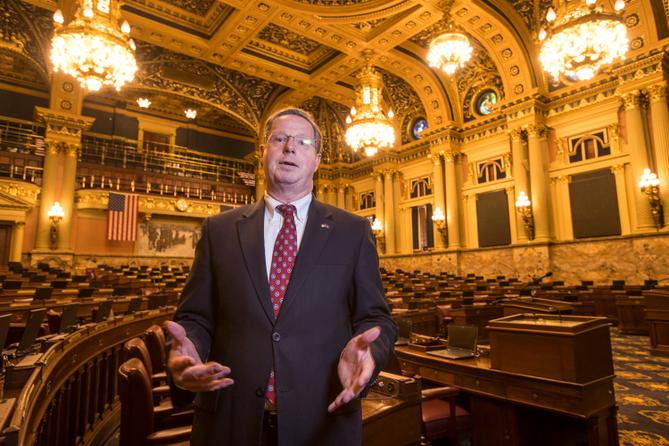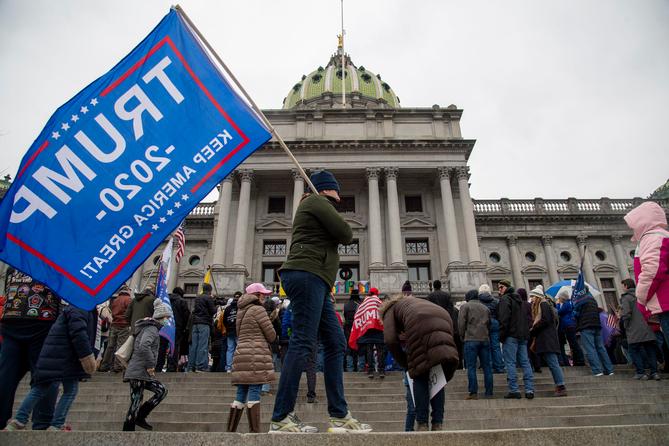Spotlight PA is an independent, nonpartisan newsroom powered by The Philadelphia Inquirer in partnership with PennLive/The Patriot-News, TribLIVE/Pittsburgh Tribune-Review, and WITF Public Media. Sign up for our free newsletters.
HARRISBURG — Despite weeks of private negotiations between Democratic Gov. Tom Wolf and legislative Republicans, Pennsylvania’s budget is officially late.
A new plan must be passed and signed into law each year by June 30 to set spending on everything from education and health care to economic development and public safety for the next 12 months.
So what caused the delay, and what comes next? Here’s what you need to know:
What’s the holdup?
Late budgets were the norm during Wolf’s first term, including multi-month impasses in 2015 and 2017 caused by lower-than-expected revenues and disagreements over how to fill the gaps.
The past few years’ budget negotiations proceeded with much less friction due to higher-than-expected revenues and the COVID-19 pandemic, which created a willingness to compromise in this area.
Despite the state’s multibillion surplus — as well as $2.2 billion in remaining federal stimulus money — talks have been difficult this year due to differing priorities among Wolf and Republican leaders, as well as emboldened conservative rank-and-file dissidents.
Talks didn’t start to move forward in earnest until Tuesday of this week. As of Thursday afternoon, exact details on the state’s multibillion dollar spending plan, along with hundreds of pages of accompanying legislation, were still being debated by top lawmakers and staff as they shuffled from private meeting to meeting.
Spotlight PA’s Capitol sources — echoed by reporting by PennLive — suggest there is a general agreement among Republicans to vote for an increase in education spending. In exchange, Wolf would sign off on GOP policy wins, such as a ban on private funding for election administration or an end to regulatory actions targeting charter schools or the natural gas industry.
Other policies on the table include a corporate tax cut, more funding for nursing homes, and using stimulus money to fund conservation projects, housing and property tax relief, public and school safety grants, and mental health services.
All sides — Wolf, legislative Republicans, and legislative Democrats — also want to see some of the multibillion surplus socked away for the future in case of a recession.
But there are still roadblocks for budget negotiators to resolve, including funding for Pennsylvania’s four state-related universities.
The schools receive hundreds of millions of dollars to subsidize in-state tuition, but that funding has been caught up in a proxy fight over abortion and the University of Pittsburgh’s fetal tissue research. State House Republicans successfully added an amendment to the funding bill that would ban Pitt from conducting such research, but Wolf, state House Democrats, and members of both parties in the Senate oppose the move.
“The #PAbudget is due today, and we are likely going to miss the deadline because Republicans have spent the week trying to raise Pitt’s tuition, banning trans kids from playing sports with their friends, and ensuring gay kids feel ostracized at school,” Senate Minority Leader Jay Costa (D., Allegheny) tweeted.

What does a late budget mean for Pennsylvanians?
In the short term, very little, according to insiders.
The state is legally bound to make debt payments, cover Medicaid costs, issue unemployment compensation payments, keep prisons open, and cut paychecks for state workers, the Associated Press reported.
Other payments, including discretionary spending on tax credits and grants, can be postponed until Wolf signs a spending plan.
House Appropriations Chair Stan Saylor (R., York), a top budget negotiator, downplayed the deadline this week, saying it’s “really not important.”
Elizabeth Rementer, a spokesperson for Wolf, said there are “no plans to furlough employees” because of a late budget.
“The core functions of state government will continue even without a spending plan approved by the General Assembly,” she said. “That includes things that affect the health, safety, and protection of Pennsylvanians.”
What’s the worst-case scenario?
When the budget was months late in previous years, public services like schools, libraries, and domestic violence agencies, had to make hard decisions regarding which bills they paid and how long they could stay open.
John Callahan, the chief advocacy officer of the Pennsylvania School Boards Associations, said that schools would begin to feel the effects of a late budget by August or September — when teachers and administrators begin to prepare for the new school year.
Schools would have to consider which bills they have to pay first — Callahan listed lights, heating, and other utilities as examples — and which they couldn’t afford, such as subscriptions to academic resources. Wealthy schools that have emergency funds or that rely more heavily on local property taxes would be able to withstand delayed budget negotiations, Callahan said.
Domestic violence service centers would begin to feel the effects of an incomplete budget by the end of August or early September, said Julie Bancroft, chief public affairs officer at the Pennsylvania Coalition Against Domestic Violence. Some programs would have to take out lines of credit or try to access alternative funds.
Beth Sturman — executive director of Laurel House, a domestic violence agency in Montgomery County — considers her organization lucky, as it was able to access a line of credit when the budget was delayed in 2015. But a limited budget forced the organization to decide what costs were essential and where it had to cut back.
“Is helping someone with a car repair so they can go to work essential? For that person, it is,” Sturman said. “But in the grander scheme of things, if we have to pick between keeping the lights on in our safe haven shelter or paying for someone’s car repair, what do we do?”

Could Trump really derail the budget?
On Wednesday, former President Donald Trump released a statement calling on Pennsylvania legislative Republicans to “get tough and smart” and tie passage of the state budget to Wolf’s agreement to sign bills restricting voting access.
That includes a stricter voter ID law, a ban on mail ballot drop boxes, and a bill from 2022 gubernatorial nominee and state Sen. Doug Mastriano (R., Franklin) that would let individuals serve as poll watchers outside their home county. Wolf has said he opposes the bill.
In May, some rank-and-file Republicans indicated that they wanted to use the budget as leverage to pass their conservative priorities. But others told Spotlight PA this week that their vote on the budget depends on the final details of the proposal, not on what Trump says (if they were even aware of the statement, which many said they were not.)
“As far as I know, there are no former presidents in the negotiating room,” state Rep. Jesse Topper (R., Fulton) said.
What’s next?
Negotiations are ongoing and will continue until a deal is reached. Talks are fluid, sources cautioned, and things slide on and off the table every day.
The state House and Senate have already scheduled voting days for Saturday, and the upper chamber is scheduled to be in Harrisburg on Sunday.
State Sen. Vincent Hughes, the ranking Democrat on his chamber’s Appropriations Committee, said that after years of Republicans saying there wasn’t enough money to invest in, say, schools and child care, taking “an extra few days” to pass a plan that meets people’s needs doesn’t mean much.
“As long as the product is responsive to the needs, we’re good,” Hughes said, “that’d be fine.”
WHILE YOU’RE HERE… If you learned something from this story, pay it forward and become a member of Spotlight PA so someone else can in the future at spotlightpa.org/donate. Spotlight PA is funded by foundations and readers like you who are committed to accountability journalism that gets results.
